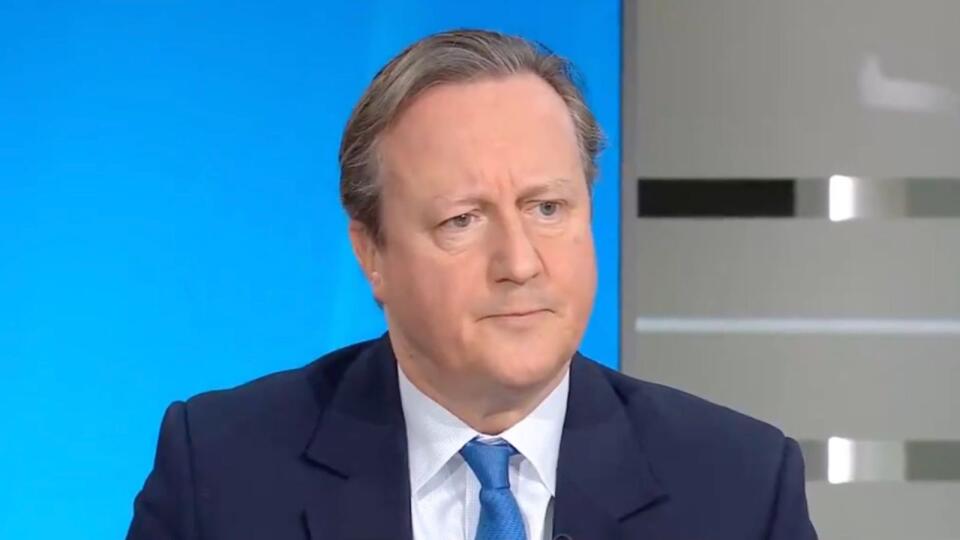David Cameron stumbles while defending Israel on Sky News. The West is jumping through rhetorical hoops to defend Israel and condemn Iran after Iranians respond to attack on diplomatic premises in Syria. – Picture: Screenshot via Peoples Dispatch
By Peoples Dispatch
It is difficult to dispute the major escalation that Israel undertook on April 1 when it bombed the Iranian embassy in Damascus, assassinating a top Iranian Commander. This was a major escalation that the West — namely, the US, UK, and France — failed to condemn during an April 2 UN Security Council meeting.
On April 13, after multiple warnings, Iran retaliated — becoming the first country to directly attack Israel in 33 years — launching “extensive” missiles and drone strikes at military targets within historic Palestine.
The attack did not result in any casualties. No hospital attacks, no mass graves, no thousands of women and children dead. Iran showed no intention of creating a mass casualty event, and predictably, many of the dozens of Iranian missiles were intercepted.
Although to some, this is a sign of Iranian weakness, not restraint. As New York Times columnist Thomas Friedman writes, Iran’s attack “showed the whole world that Israel and its Western allies have far superior anti-missile capabilities than Iran has missile capabilities”.
Friedman also claims that Iran revealed “that President Biden was able to predict almost the exact hour of attack over a day in advance”, citing that fact that Biden warned Iran not to attack the day prior. Friedman does not take into account that Iranian officials had been openly stating their intention to retaliate against the Zionist state since the embassy attack in Damascus.
This is a point of view seemingly shared by Biden, who said shortly after the attack, “Israel demonstrated a remarkable capacity to defend against and defeat even unprecedented attacks — sending a clear message to its foes that they cannot effectively threaten the security of Israel.”
It is unclear how the attacks were unprecedented, however, given that following the embassy attack, Iran’s Ambassador to Damascus Hossein Akbari, whose residence was bombed in the strike, said, “We will give a decisive response to this action.”
It is international relations common sense that the bombing of an embassy is a major escalation. UN Secretary-General Antonio Guterres said, following Iran’s striking of Israel, that “the principle of inviolability of diplomatic and consular premises and personnel must be respected in all cases in accordance with international law, as I stated when condemning the 1 April attack on the Iranian consulate in Damascus”.
David Cameron, British Foreign Secretary, went on Sky News to denounce the Iranian attack on Israel, but was thrown off guard when a journalist asked, “What would Britain do if a hostile nation flattened one of our consulates?”
Cameron stuttered through his response, “Well, we would take very strong action.”
Israel has been attacking both Iran and Iranian targets for years. On January 20, Israel killed five members of the Islamic Revolutionary Guards Corps (IRGC) in Damascus. At the time, Iranian foreign minister Hossein Amir Abdollahian claimed that “although the Zionist enemy has destroyed Gaza on a large scale and martyred tens of thousands of people, it has not achieved any of its goals, so it is trying to make up for its defeat by resorting to blind terrorism”.
In February of last year, Iran accused Israel of attacking a military workshop complex in Isfahan. Iranian oil tankers carrying oil to Lebanon through Syria were attacked late on November 8. According to IRIB, Iran’s state news source, the attacks were carried out using “Israeli drones”. Israel has openly boasted about committing covert operations against Iran, including the assassination of a nuclear scientist in 2020.
Biden reiterated the US’s “ironclad” support for Israel, promising a Group of Seven (G7) diplomatic response. However, following a similar pattern of recent Biden administration responses to Israeli aggression, a Biden official leaked to Axios that the president privately warned Israeli Prime Minister Benjamin Netanyahu that the US would not support a counter attack against Iran. Biden has several times expressed private frustrations with Netanyahu as the genocide against Gaza continues to unfold, but continues to send massive weapons shipments to Israel and provide unconditional support in public.
Israel’s war cabinet is now meeting to discuss potential responses. According to a source communicating with NBC News, an Israeli counter attack could be imminent.
This article was first published on Peoples Dispatch




